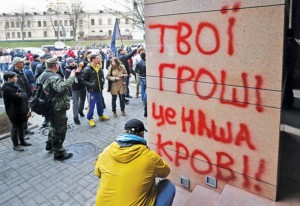Rinat Akhmetov has barely been seen in public since fleeing his hometown Donbas region, which he once ruled almost as a personal fiefdom.
“On May 20, 2014 Rinat Leonidovich left for three days from Donetsk to Kyiv, and since then, unfortunately, has never returned to the Donbas. All this time, Mr. Akhmetov has lived and worked in Kyiv,” a spokesperson said in written responses to Kyiv Post inquiries.
The oligarch reportedly owns a luxury flat in downtown Kyiv and an estate outside of the capital.
“As soon as it becomes possible for him to return to his native Donetsk, I can assure you … there will be maximum public information,” the spokesperson added.
In Donetsk, Akhmetov often resided at a vast estate protected by high cement walls. Reporters visiting the occupied region in 2014-2015 witnessed that the road towards it’s entrance was guarded by militants identifying themselves as members of the Vostok Battalion, headed at the time by Alexander Khodakovsky.
Khodakovsky served as “national security chief” of the so-called Donetsk People’s Republic by January, when he announced he had become an opposition figure to Alexander Zakharchenko, leader of the so-called Donetsk People’s Republic. Khodakovsky used to head the elite Alfa special forces unit of Ukraine’s SBU state security services in Donetsk region and has in interviews admitted to being part of security forces that clashed with Euromaidan Revolution activists during Viktor Yanukovych’s last weeks as president.
Despite lingering suspicions that Akhmetov’s Donetsk estate was under the control of a militant group headed by a man who is suspected of having ties to the oligarch, his spokesperson insisted that “No battalions have ever defended the residence of Rinat Akhmetov. Any information spread regarding this is total nonsense.”

Activists picket Rinat Akhmetov’s office on April 13, 2014, in Kyiv. The writing on the wall reads: “Your money is our blood.” (UNIAN)
The spokesperson added: “Please don’t believe rumors or wild guesses. Nobody has lived or has been based in the house of Rinat Leonidovich since he left. The guards and gardeners are watching the house as they did before. They have worked there for many years, and continue to work there now.”
The Kyiv Post was unable to corroborate the presence of these guards and gardeners at the estate through reports, or its own on-ground reporting in Donetsk during 2014-2016. Akhmetov was rarely seen in public after he left Donetsk in May 2014.
Nonetheless, the spokesperson insisted: “Rinat Leonidovich, from the first days of the conflict, is constantly communicating with various people who are able to influence the establishment of peace in the Donbas. Rinat Leonidovich knows many people. And he is known by many. And I am deeply convinced that all that Rinat Akhmetov says publicly, he also voices on numerous personal meetings: that Donbas can be happy only in a united Ukraine; that it should be achieved only in a peaceful way; that people must not suffer; (that) people must not die; that blood must not be shed.”
The spokesperson added: “Rinat Akhmetov has held hundreds if not thousands of meetings over the past two years. Diplomats of the world’s leading countries, including the representatives of the U.S. Embassy, are also interested by the position of Mr. Akhmetov, by the results of his humanitarian activity, the amount of (his) aid.”
That may be so, but it appears Akhmetov is still struggling to get a visa to the United States. In 2011, the Kyiv Post reported that he was unable for several years to obtain a visa to the world’s most powerful country. Asked if the visa had been issued yet, in February the spokesperson said “as far as I know, the visa application of Mr. Akhmetov is now being processed by the U.S. State Department.”
In October, Akhmetov’s spokesperson refused to comment on the status of the businessman’s visa, saying this information was personal.
The spokesperson did not answer other specific questions on what could be sensitive issues for Akhmetov.
The spokesperson did not answer a question asking why Russian-backed separatists make an exception by allowing his foundation to directly disburse humanitarian aid in the occupied regions, while not allowing Ukraine’s government and other organizations to do the same.
The spokesperson did not answer questions regarding the relations Akhmetov may have had with Khodakovsky, the other separatist leader Alexander Zakharchenko and Andriy Shyshatsky, the former Donetsk Oblast governor who allegedly took part in separatist activities.
The spokesperson did not answer a question asking when he had last visited Russia.
The spokesperson did not answer a question inquiring on whether he had held discussions with Vladislav Surkov, an adviser to Russian President Vladimir Putin on the Kremlin’s annexation of Crimea and its war in the Donbas.
The spokesperson also didn’t respond to a question asking how often Akhmetov may have discussed the Donbas conflict with Viktor Medvedchuk, a former Ukrainian presidential chief of staff who is personally close to Putin and is involved in the Minsk peace process, formally in the area of exchanging hostages.
Likewise, the Kremlin press service didn’t respond to a Kyiv Post inquiry on whether the Russians held discussions with Akhmetov about the war.
